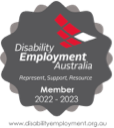It can be quite daunting and overwhelming looking for work.
We have created a 10 Step Guide Solve the Job Search puzzle to help ensure a seamless and positive process; including what you can do if it doesn’t all go according to plan.
1. Get support for the job search journey.
You don’t need to do this alone. Chat to your Employment Adviser or Disability Employment Advocate about how TURSA can support you to not only get a job, but also to keep it. We have been supporting people into jobs for over 25 years and are available to help you do the same.
Contact your closest TURSA site on 1800 670 914 or contact us here.
2. Know what job you want.
There are thousands of jobs out there, but that doesn’t mean you need to apply for all of them. You already have a set of skills, experiences and areas of interest to bring to your job search. Therefore, there is no point applying for just any job – it needs to serve a purpose and be something you are capable of doing.
If you are unsure, The Australian Government has a great resource job outlook where you can complete a career quiz to see what careers may suit you.
There is also a career quiz to help guide you in the right direction. Complete the career quiz here.
3. Create your resume.
Before you can really start applying for multiple jobs, you need to have the right tools in place which starts with a resume. Your resume is an overview and summary of all your skills, work experience, education and training you have done.
Ensure that it is tailored to the industry and role you are applying for.
For resume help – read our article here.
4. Type up a cover letter.
A cover letter is an overview of your resume and how it relates directly to the jobs you are applying for. Your cover letter will highlight why you are applying for the job, and how your skills, experience and education relate to the job with your key stand out points highlighted!
For guidance on how to write a stand out cover letter – read here.
5. Start your job search – Use Your Network.
There are numerous ways to find vacancies, whether it be the internet, word-of-mouth or via face-to-face.
The most effective way to get a job is through the people you already know. Your friends, family members, acquaintances are all connected to different people and businesses as well. They may know of jobs going, know someone who does, or be able to provide suggestions of their own.
6. Face to Face Job Search.
Searching for work by walking into businesses you would like to work is also effective. Take a walk around local shopping centres and CBD’s to see what may be advertised on the window. Remember to take your resume with you and dress to impress, so that you can drop your resume in straight away to any vacancies you see. While it may be more time consuming than some other methods, by applying for jobs face to face shows the employer you are keen and they get to meet you in person, than just on a piece of paper and helps you stand out in the crowd of other applications.
Alternatively, you can also directly call employers you would like to work for to introduce yourself and why you would be a suitable employee for their business.
7. Internet Job Search.
The internet job search websites allow you to apply for many jobs, in a short period of time. Join recruitment sites and start searching for roles in the follow places:
Make a profile including your resumes, availability, goals, cover letter.
This will enable you to set alerts for any new jobs that pop up in your desired field.
8. Follow up.
There is no point applying for numerous jobs if you are not going to follow up your application
Call each business that you have applied for a job to with the following spiel as a guide:.
“Hi, it’s Cindy. I recently applied for the Barista position you had advertised. I was calling to see how my application was going and to find out when you are conducting interviews”
This will show the employer you are going that extra mile and you are extra keen to gain an interview! With so many jobseekers out there, it is best to stand out!
9. Work Experience.
If you are still struggling to find a job, you should consider doing some work experience or voluntary work to gain additional experience and skills. This shows you are motivated and can help improve your applications with updated work experience and skills also.
For more information on how we can support you with gaining work experience, you can view information on the National Work Experience Programme here: National Work Experience Programme – Department of Education, Skills and Employment, Australian Government (dese.gov.au)
10. Upskilling.
Another way to improve your chances of success if you are struggling to get a job, is by increasing your skills through education and training. There are many courses available, both short and long that can help you improve your skills or qualifications that will strengthen your job applications.
Read our blog post on Upskilling here.
















